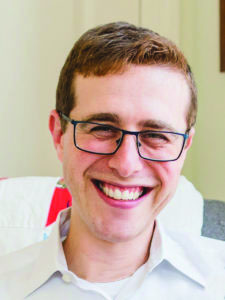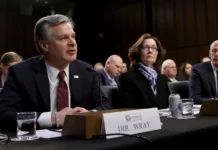

By Shira Goodman and Jeremy Bannett
Eighty-eight years ago, President Franklin D. Roosevelt famously proclaimed, “The only thing we have to fear is fear itself.” This was a bold assertion: America was in the throes of the Great Depression, which sent millions of Americans into destitution and suffering. Yet Roosevelt knew that the economic crisis was a problem that Americans could solve if they remained resolute, strong and united. He understood that the biggest threat to America was not the Depression itself, but the division, extremism and inertia that would come from our nation succumbing to fear and anxiety.
Today, as Jews around the world are buffeted by a wave of vicious antisemitism, Roosevelt’s words hold important lessons. Fear is not the only thing we have to be afraid of, but fear exacerbates the problems we are confronting. American Jews can defeat this surge in anti-Jewish hate as we have before, but only if we stay focused, vigilant and undivided — and if we do not give in to fear.
Let us be clear: Jews around the world are facing a very real spike in antisemitism. During the two weeks of the recent military conflict between Israel and Hamas, antisemitic incidents in the U.S. reported to ADL increased by 75% compared to the two weeks before the fighting began. Incidents included vicious assaults on Jews in Los Angeles, New York and elsewhere, people harassed on the street with calls of “Death to the Jews” and the promotion of antisemitic rhetoric, images and conspiracy theories at rallies, including in Philadelphia.
Since May 16, there have been more than 200 rallies protesting Israel, an unprecedented number, and while many did not include antisemitic language, much of the spike in antisemitic incidents can be traced to individuals attending these events. Jews found no safe haven online, where extremists across the ideological spectrum tried to take advantage of the conflict to mainstream their antisemitism. Anti-Jewish hate ballooned on sites like 4chan, long a cesspool of hate, but also on mainstream platforms like Twitter, which hosted over 17,000 Tweets promoting some iteration of the phrase “Hitler was Right” during the first week of the conflict.
Placing this recent surge in the context of record-breaking numbers of antisemitic incidents over the last few years, it will come as no surprise to learn that American Jews are deeply concerned. A recent survey found that 59% of American Jews feel less safe today than they did just five years ago. Nearly a third of Jews have changed their behaviors out of fears of antisemitism, including avoiding Jewish institutions and events, refraining from wearing Jewish clothing or symbols and not identifying themselves as Jewish on social media. Thirty-three percent of Jews report trouble sleeping because of antisemitism, with smaller but still significant numbers reporting negative financial and psychological impacts from antisemitic harassment.
Indeed, these are frightening times, and many Jews understandably feel afraid. But if we want to defeat antisemitism, we cannot allow fear to get the better of us. Fear clouds our judgment, reduces our credibility, divides us and fuels a vicious cycle that undermines our ability to effectively counter anti-Jewish hate.
Fear has played a central role in the uptick in unfounded antisemitic incident reports that have circulated around the region and across the nation in recent weeks. Fear has led some to misinterpret their interactions with strangers as antisemitic incidents. Because our lives are entwined with social media, our first reaction is often to post about an incident so that others know and can share our experiences. This impulse, though well-intentioned, has fueled the widespread dissemination of unsubstantiated allegations of antisemitism, increasing levels of anxiety in the Jewish community. It has caused infighting and increased tensions and strained the community’s credibility with critical partners.
Unfounded reports of antisemitism are a serious concern for the Jewish community. Our ability to swiftly and seriously respond to antisemitic incidents relies on relationships and reputation, which are jeopardized by unfounded reports. Law enforcement, government agencies, civil rights organizations and community leaders must trust us when we sound the alarm about antisemitism. If they cannot, then we will have fewer allies and tools to fight anti-Jewish hate, which will only lead to more fear and refresh the vicious cycle.
We must stay united and focused on fighting antisemitism. Reporting antisemitic incidents is an essential piece to combating anti-Jewish hate. So how can we ensure we are reporting acts of antisemitism without inadvertently promoting unfounded allegations and contributing to the cycle of fear?
If you personally experience an antisemitic incident, document the event, report it to your rabbi, the ADL and, if you believe you are in danger or the victim of a crime, to law enforcement. Importantly, wait to post it to social media until you get support and guidance. If you hear about an incident or read about one on social media, please do not share it. Instead, reach out privately to offer support and learn more, and encourage the victim to report it to the proper authorities. If you do not personally know the person who is claiming an incident occurred, talk to whomever you learned about it from and determine if they can encourage the victim to make an official report. More broadly, community members and allies should come together to take proactive and positive action, engaging in education, advocacy and outreach to build essential and informed relationships with key partners.
In these trying times, there is certainly more to fear than fear itself. But fear complicates our efforts to fight antisemitism. If we can reject fear, stand together, stay vigilant and focused, we can bring the energy, creativity and community needed to defeat anti-Jewish hate.
Shira Goodman is the Regional Director and Jeremy Bannett is the Senior Associate Regional Director of the ADL’s Philadelphia Regional Office.






